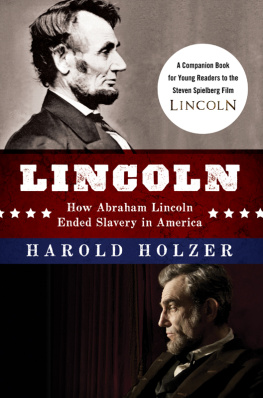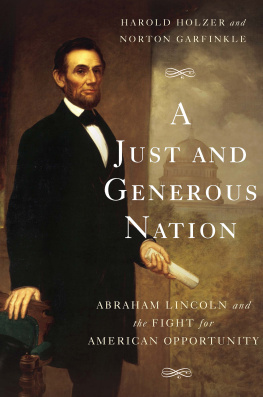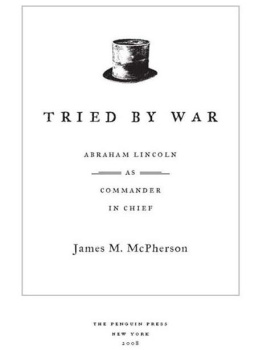Thank you for downloading this Simon & Schuster eBook.
Join our mailing list and get updates on new releases, deals, bonus content and other great books from Simon & Schuster.
C LICK H ERE T O S IGN U P
or visit us online to sign up at
eBookNews.SimonandSchuster.com
We hope you enjoyed reading this Simon & Schuster eBook.
Join our mailing list and get updates on new releases, deals, bonus content and other great books from Simon & Schuster.
C LICK H ERE T O S IGN U P
or visit us online to sign up at
eBookNews.SimonandSchuster.com
ALSO BY HAROLD HOLZER FROM SIMON & SCHUSTER
Lincoln at Cooper Union: The Speech That Made Abraham Lincoln President
Lincoln President-Elect: Abraham Lincoln and the Great Secession Winter, 18601861

Simon & Schuster
1230 Avenue of the Americas
New York, NY 10020
www.SimonandSchuster.com
Copyright 2014 by Harold Holzer
All rights reserved, including the right to reproduce this book or portions thereof in any form whatsoever. For information address Simon & Schuster Subsidiary Rights Department, 1230 Avenue of the Americas, New York, NY 10020.
First Simon & Schuster hardcover edition October 2014
SIMON & SCHUSTER and colophon are registered trademarks of Simon & Schuster, Inc.
The Simon & Schuster Speakers Bureau can bring authors to your live event. For more information or to book an event contact the Simon & Schuster Speakers Bureau at 1-866-248-3049 or visit our website at www.simonspeakers.com.
Interior design by Joy OMeara
Jacket design by Tom McKeveny
Jacket art: Portrait of Lincoln John Hay Library, Brown University via Abraham Lincoln Book Shop, Inc.
Library of Congress Cataloging-in-Publication Data
Holzer, Harold.
Lincoln and the power of the press : the war for public opinion / Harold Holzer. First Simon & Schuster hardcover edition.
pages cm
Includes index.
1. Lincoln, Abraham, 18091865Relations with journalists. 2. United StatesHistoryCivil War, 18611865Journalists. 3. United StatesHistoryCivil War, 18611865Press coverage. 4. Press and politicsUnited StatesHistory19th century. 5. United StatesPolitics and government18611865. I. Title.
E457.2.H77 2014
973.71dc23
2014021392
ISBN 978-1-4391-9271-9
ISBN 978-1-4391-9274-0 (ebook)
For Edith
CONTENTS
INTRODUCTION
A More Efficient Service

He who moulds public sentiment, goes deeper than he who enacts statutes or pronounces decisions.
Abraham Lincoln, August 21, 1858
T o many of his thriving neighbors, Abraham Lincolns hometown of Springfield, Illinois, seemed by the 1850s nothing less than a paradise in miniature. Abundant with stores, taverns, and shops, and illuminated by modern, gas-fed lights, even the unpaved, mud-mired streets could not inhibit what Lincoln called a great deal of flourishing about in carriages.
Behind its serenely bustling facade, however, the frontier capital also ranked as one of the most contentiously riven political hotbeds in the countrya seething two-party battleground where election campaigns took on the militant urgency of outright war, and combatants deployed newspapers as their most powerful weapons. Such was never more the case than in 1859the eve of the most potentially divisive presidential election in American history.
As a state capital boasting some nine thousand permanent residentsand far greater than that number whenever politicians and lobbyists jammed into town for annual legislative sessionsSpringfield served as a year-round stage for partisan speeches, rallies, parades, picnics, barbecues, illuminations, conventions, and outright street brawls over both issues and candidates. Even
Fueling this combustible mix were Springfields two major newspapers. Both covered neighborhood news with anodyne charm, but when it came to local, state, and national politics, both stoked the ferment with an overtly partisan style that combined advocacy with almost libelous criticism. One paper was dependably pro-Democratic, the other unfailingly pro-Republican, and each was steadfastly, often maliciously, opposed to the other. Rather than merely reprint what one editor termed the citys constant flood of eloquence from politicians on both sides, these irreconcilable journals could be depended on to laud allies and eviscerate opponents. When they were not dishing out equal doses of praise and rage in their regular editions, they engaged their presses to print party pamphlets and political orations. If they were fortunate and well connected, they received rewards for their loyalty in the form of government printing jobs. The mutual interdependence that grew up between the press and politics made for a toxic brew. No politician was above it, no editor beyond it, and no reader immune to it.
Now, with the next national election only a year away, with the contest already being widely touted as the most crucial of the century, and with the issue of slavery roiling the country, local interest in national issues and personalities approached a fever pitch in Springfield, in part for a reason unique to this otherwise typically divided Western city. For by 1859, its residents could boast that their town had incubated two immensely gifted potential aspirants for the White House: United States senator Stephen A. Douglas, and former congressman Abraham Lincoln.
Douglas, the Little Giant, led the pack among his fellow Democrats. And while Long Abraham was perhaps not yet widely known enough nationally to rank as a top-tier contender for the Republicans, he remained an intriguing dark-horse possibility for their ticketperhaps, as some ardent supporters began whispering, for vice president. No one knows precisely when Lincoln began aiming still higher, but to bring the presidency within his sights he certainly knew where he needed first to burnish his political profile: in the Republican Party press, and not just among the usual loyalists who For now, however, Lincoln still lacked both real political power and routine attention in the press beyond Springfield. And he still thirsted for both.
That May, Lincoln made a remarkable move to recalibrate this frustrating political equilibrium. The lifelong and voracious newspaper reader decided to become a newspaper owner as wellby acquiring a weekly journal complete with its own printing press and a politically compatible editor ready to churn out enthusiastic editorials lauding him. It did not seem to matter that he would never be able to read the product himself. For the paper would be printed in German, a language he had only briefly studied but never mastered. Moreover, it would be composed in Gothic-style Fraktur typeface, an elaborate black-letter script no more decipherable to him than Sanskrit.
To comprehend what motivated this indelibly American politician to purchase a foreign language newspaper he could never hope to comprehend requires a quantum leap of historical imaginationback to an era when the press and politics were profoundly interconnected, and newspapers themselves became more overtly partisan, more narrowly targeted, yet more deeply influential than at any time before or since.
Abraham Lincolns emergence as a newspaper publisher constituted but one example of the pervasive and sometimes incestuous relationships that grew up between politicians and journalists in the fierce battles for public opinion and government power in the decades leading up to the Civil Warand beyond. That such affiliations, however common at the time, were still considered vaguely unsavory by some, seems evident in how assiduously Lincoln kept his own newspaper investment quiet. Except for his private banker, his law partner, and but one fellow Illinois Republican politician, he seems to have told no one about the purchase at the time, or, indeed, for the rest of his life. For four score years, his involvement remained largely unknown even to biographers. Yet the truth is, the arrangement would likely have surprised, much less scandalized, few of his contemporaries.
Next page






